Analyzing the Contemporary Business Environment: A GSK Case Study
VerifiedAdded on 2023/01/13
|10
|3587
|97
Report
AI Summary
This report examines the contemporary business environment, focusing on how business culture and natural environments shape organizational behavior. The report uses Glaxosmithkline (GSK) as a case study, analyzing its operations within the UK and globally. It explores the impact of economic factors like Brexit, economic systems, and policies, as well as non-economic factors including natural, demographic, and cultural influences. A PESTLE analysis is conducted to assess political, economic, social, technological, legal, and environmental factors affecting GSK. The report considers internal capabilities and competencies, emphasizing how these factors influence GSK's strategies and its ability to capitalize on market opportunities and mitigate threats. The report highlights how businesses must adapt to dynamic environments and leverage internal strengths to survive and thrive.
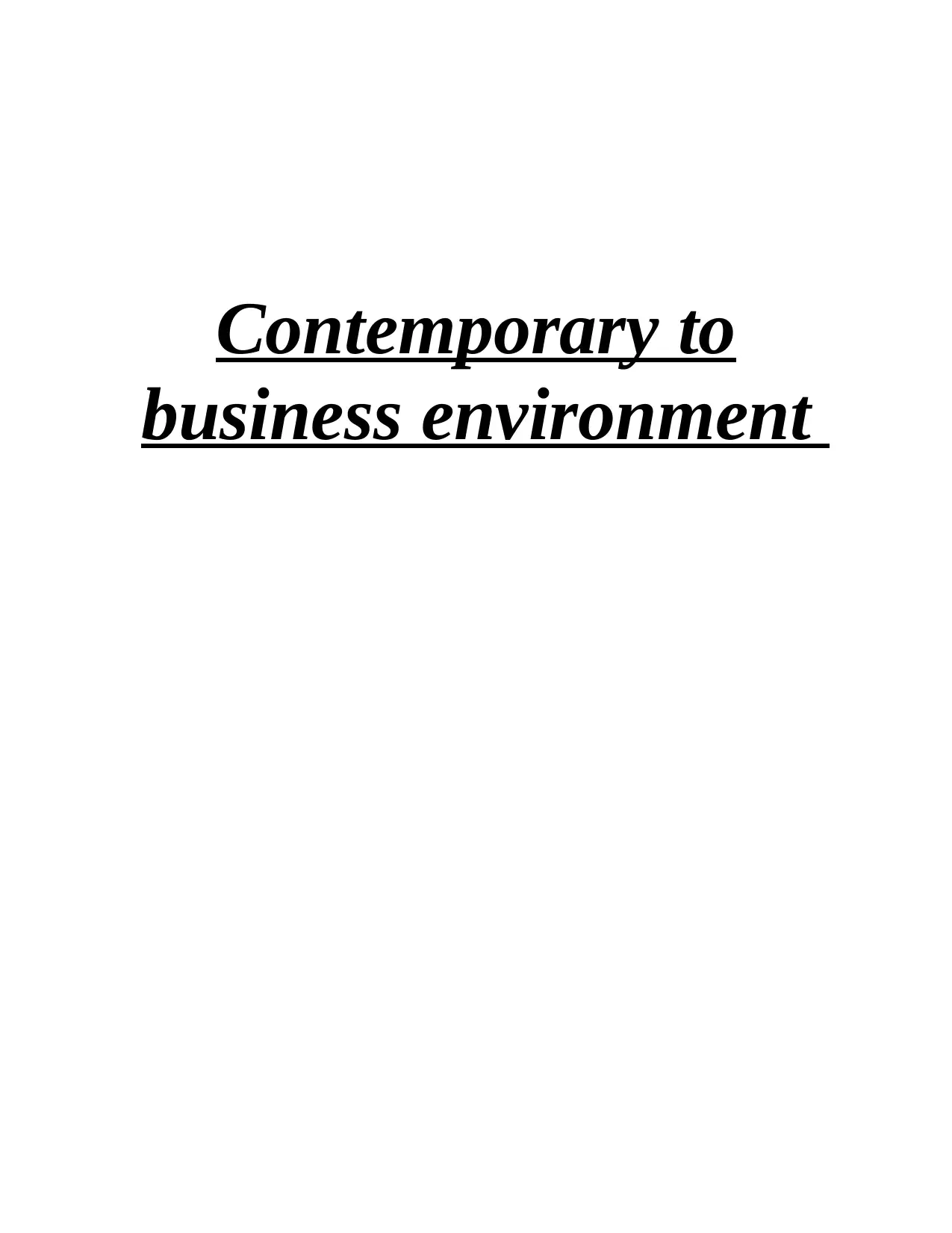
Contemporary to
business environment
business environment
Paraphrase This Document
Need a fresh take? Get an instant paraphrase of this document with our AI Paraphraser
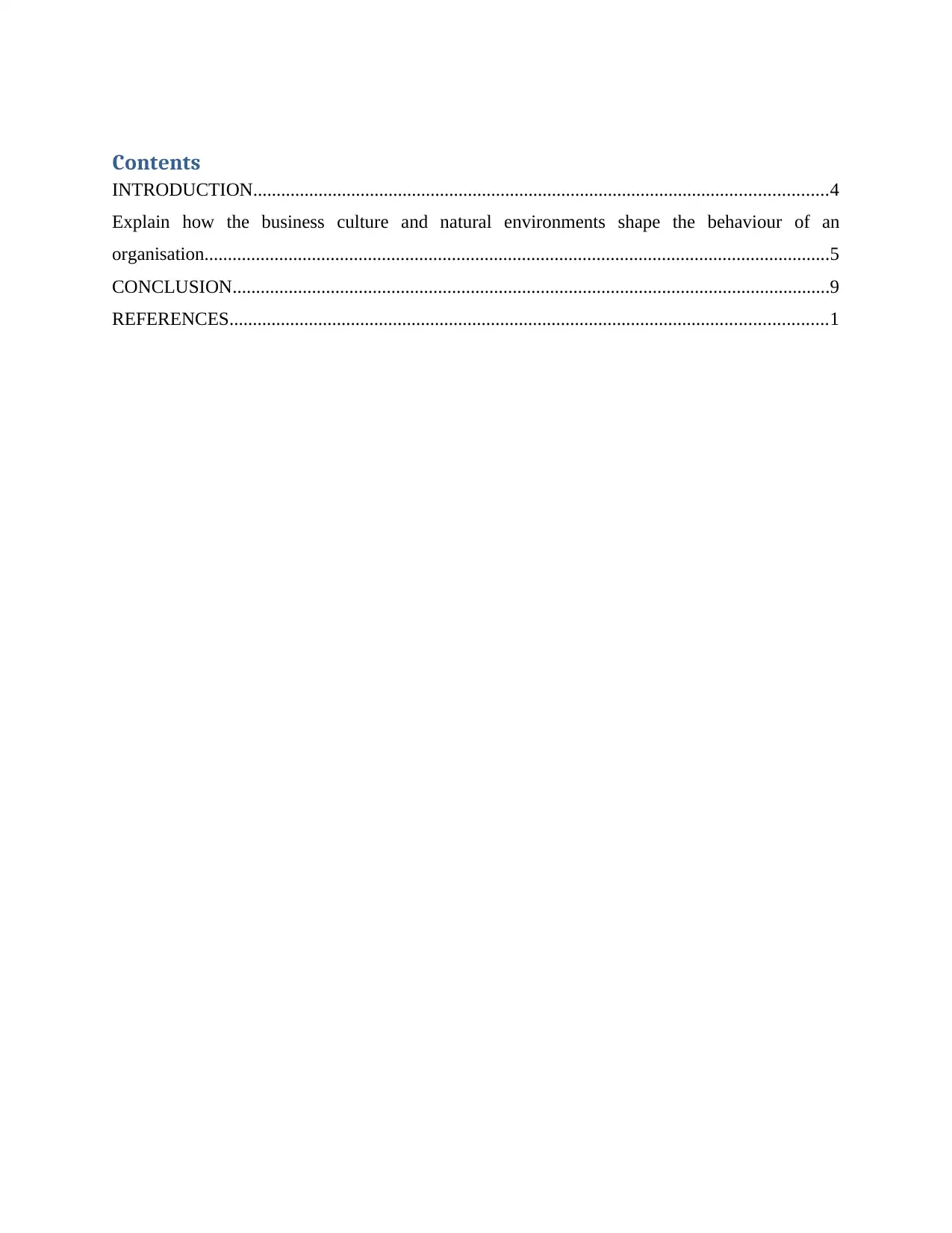
Contents
INTRODUCTION...........................................................................................................................4
Explain how the business culture and natural environments shape the behaviour of an
organisation......................................................................................................................................5
CONCLUSION................................................................................................................................9
REFERENCES................................................................................................................................1
INTRODUCTION...........................................................................................................................4
Explain how the business culture and natural environments shape the behaviour of an
organisation......................................................................................................................................5
CONCLUSION................................................................................................................................9
REFERENCES................................................................................................................................1
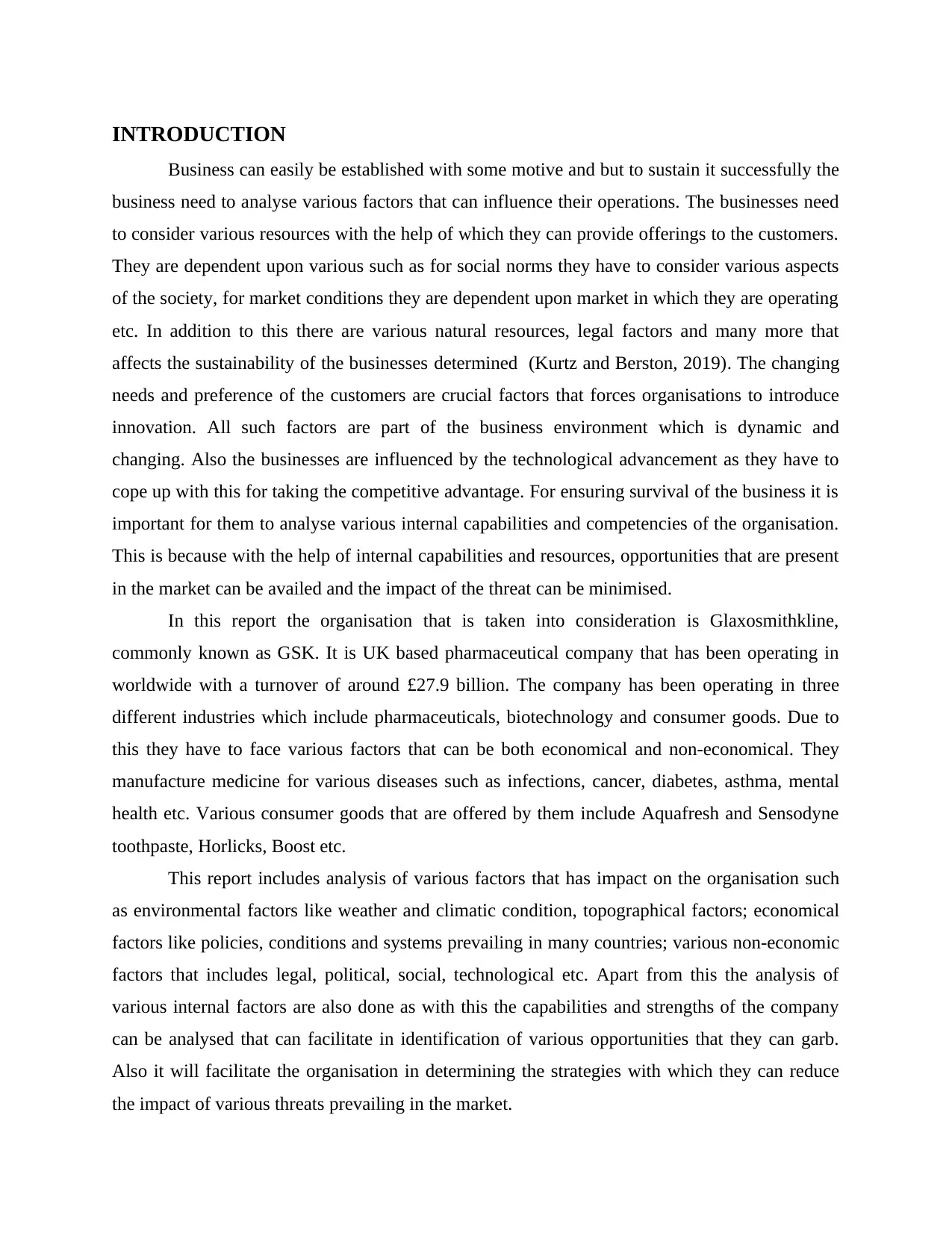
INTRODUCTION
Business can easily be established with some motive and but to sustain it successfully the
business need to analyse various factors that can influence their operations. The businesses need
to consider various resources with the help of which they can provide offerings to the customers.
They are dependent upon various such as for social norms they have to consider various aspects
of the society, for market conditions they are dependent upon market in which they are operating
etc. In addition to this there are various natural resources, legal factors and many more that
affects the sustainability of the businesses determined (Kurtz and Berston, 2019). The changing
needs and preference of the customers are crucial factors that forces organisations to introduce
innovation. All such factors are part of the business environment which is dynamic and
changing. Also the businesses are influenced by the technological advancement as they have to
cope up with this for taking the competitive advantage. For ensuring survival of the business it is
important for them to analyse various internal capabilities and competencies of the organisation.
This is because with the help of internal capabilities and resources, opportunities that are present
in the market can be availed and the impact of the threat can be minimised.
In this report the organisation that is taken into consideration is Glaxosmithkline,
commonly known as GSK. It is UK based pharmaceutical company that has been operating in
worldwide with a turnover of around £27.9 billion. The company has been operating in three
different industries which include pharmaceuticals, biotechnology and consumer goods. Due to
this they have to face various factors that can be both economical and non-economical. They
manufacture medicine for various diseases such as infections, cancer, diabetes, asthma, mental
health etc. Various consumer goods that are offered by them include Aquafresh and Sensodyne
toothpaste, Horlicks, Boost etc.
This report includes analysis of various factors that has impact on the organisation such
as environmental factors like weather and climatic condition, topographical factors; economical
factors like policies, conditions and systems prevailing in many countries; various non-economic
factors that includes legal, political, social, technological etc. Apart from this the analysis of
various internal factors are also done as with this the capabilities and strengths of the company
can be analysed that can facilitate in identification of various opportunities that they can garb.
Also it will facilitate the organisation in determining the strategies with which they can reduce
the impact of various threats prevailing in the market.
Business can easily be established with some motive and but to sustain it successfully the
business need to analyse various factors that can influence their operations. The businesses need
to consider various resources with the help of which they can provide offerings to the customers.
They are dependent upon various such as for social norms they have to consider various aspects
of the society, for market conditions they are dependent upon market in which they are operating
etc. In addition to this there are various natural resources, legal factors and many more that
affects the sustainability of the businesses determined (Kurtz and Berston, 2019). The changing
needs and preference of the customers are crucial factors that forces organisations to introduce
innovation. All such factors are part of the business environment which is dynamic and
changing. Also the businesses are influenced by the technological advancement as they have to
cope up with this for taking the competitive advantage. For ensuring survival of the business it is
important for them to analyse various internal capabilities and competencies of the organisation.
This is because with the help of internal capabilities and resources, opportunities that are present
in the market can be availed and the impact of the threat can be minimised.
In this report the organisation that is taken into consideration is Glaxosmithkline,
commonly known as GSK. It is UK based pharmaceutical company that has been operating in
worldwide with a turnover of around £27.9 billion. The company has been operating in three
different industries which include pharmaceuticals, biotechnology and consumer goods. Due to
this they have to face various factors that can be both economical and non-economical. They
manufacture medicine for various diseases such as infections, cancer, diabetes, asthma, mental
health etc. Various consumer goods that are offered by them include Aquafresh and Sensodyne
toothpaste, Horlicks, Boost etc.
This report includes analysis of various factors that has impact on the organisation such
as environmental factors like weather and climatic condition, topographical factors; economical
factors like policies, conditions and systems prevailing in many countries; various non-economic
factors that includes legal, political, social, technological etc. Apart from this the analysis of
various internal factors are also done as with this the capabilities and strengths of the company
can be analysed that can facilitate in identification of various opportunities that they can garb.
Also it will facilitate the organisation in determining the strategies with which they can reduce
the impact of various threats prevailing in the market.
You're viewing a preview
Unlock full access by subscribing today!
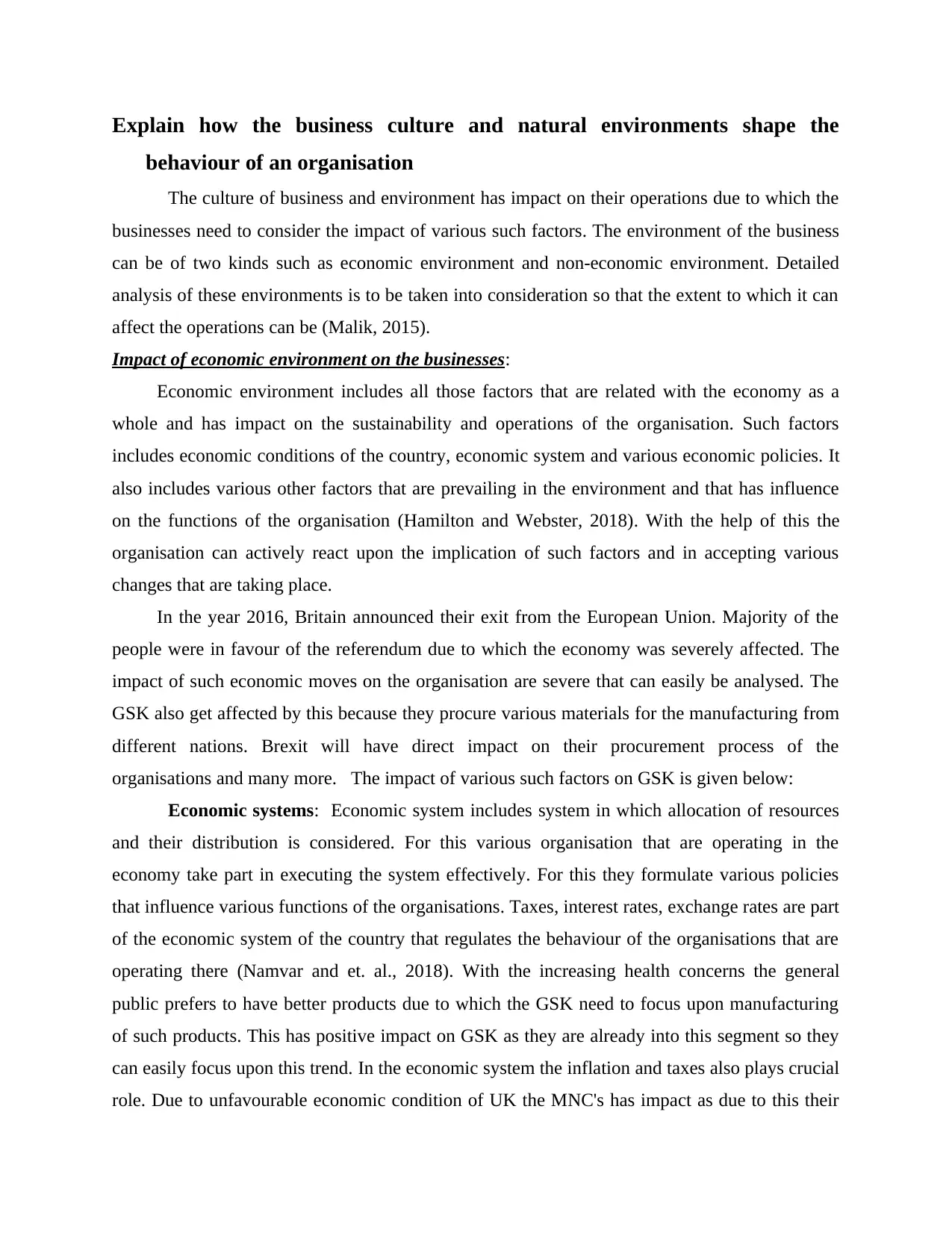
Explain how the business culture and natural environments shape the
behaviour of an organisation
The culture of business and environment has impact on their operations due to which the
businesses need to consider the impact of various such factors. The environment of the business
can be of two kinds such as economic environment and non-economic environment. Detailed
analysis of these environments is to be taken into consideration so that the extent to which it can
affect the operations can be (Malik, 2015).
Impact of economic environment on the businesses:
Economic environment includes all those factors that are related with the economy as a
whole and has impact on the sustainability and operations of the organisation. Such factors
includes economic conditions of the country, economic system and various economic policies. It
also includes various other factors that are prevailing in the environment and that has influence
on the functions of the organisation (Hamilton and Webster, 2018). With the help of this the
organisation can actively react upon the implication of such factors and in accepting various
changes that are taking place.
In the year 2016, Britain announced their exit from the European Union. Majority of the
people were in favour of the referendum due to which the economy was severely affected. The
impact of such economic moves on the organisation are severe that can easily be analysed. The
GSK also get affected by this because they procure various materials for the manufacturing from
different nations. Brexit will have direct impact on their procurement process of the
organisations and many more. The impact of various such factors on GSK is given below:
Economic systems: Economic system includes system in which allocation of resources
and their distribution is considered. For this various organisation that are operating in the
economy take part in executing the system effectively. For this they formulate various policies
that influence various functions of the organisations. Taxes, interest rates, exchange rates are part
of the economic system of the country that regulates the behaviour of the organisations that are
operating there (Namvar and et. al., 2018). With the increasing health concerns the general
public prefers to have better products due to which the GSK need to focus upon manufacturing
of such products. This has positive impact on GSK as they are already into this segment so they
can easily focus upon this trend. In the economic system the inflation and taxes also plays crucial
role. Due to unfavourable economic condition of UK the MNC's has impact as due to this their
behaviour of an organisation
The culture of business and environment has impact on their operations due to which the
businesses need to consider the impact of various such factors. The environment of the business
can be of two kinds such as economic environment and non-economic environment. Detailed
analysis of these environments is to be taken into consideration so that the extent to which it can
affect the operations can be (Malik, 2015).
Impact of economic environment on the businesses:
Economic environment includes all those factors that are related with the economy as a
whole and has impact on the sustainability and operations of the organisation. Such factors
includes economic conditions of the country, economic system and various economic policies. It
also includes various other factors that are prevailing in the environment and that has influence
on the functions of the organisation (Hamilton and Webster, 2018). With the help of this the
organisation can actively react upon the implication of such factors and in accepting various
changes that are taking place.
In the year 2016, Britain announced their exit from the European Union. Majority of the
people were in favour of the referendum due to which the economy was severely affected. The
impact of such economic moves on the organisation are severe that can easily be analysed. The
GSK also get affected by this because they procure various materials for the manufacturing from
different nations. Brexit will have direct impact on their procurement process of the
organisations and many more. The impact of various such factors on GSK is given below:
Economic systems: Economic system includes system in which allocation of resources
and their distribution is considered. For this various organisation that are operating in the
economy take part in executing the system effectively. For this they formulate various policies
that influence various functions of the organisations. Taxes, interest rates, exchange rates are part
of the economic system of the country that regulates the behaviour of the organisations that are
operating there (Namvar and et. al., 2018). With the increasing health concerns the general
public prefers to have better products due to which the GSK need to focus upon manufacturing
of such products. This has positive impact on GSK as they are already into this segment so they
can easily focus upon this trend. In the economic system the inflation and taxes also plays crucial
role. Due to unfavourable economic condition of UK the MNC's has impact as due to this their
Paraphrase This Document
Need a fresh take? Get an instant paraphrase of this document with our AI Paraphraser
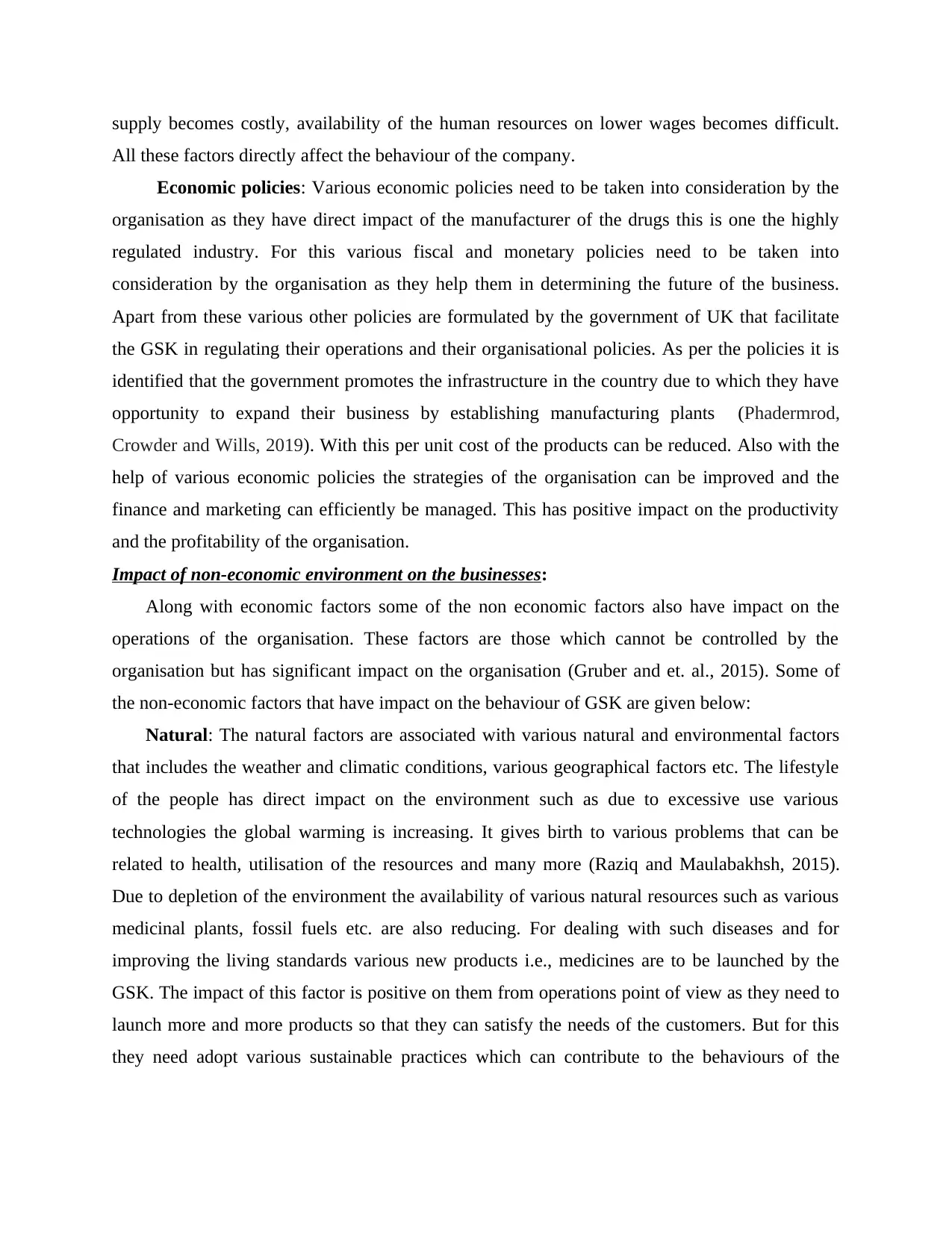
supply becomes costly, availability of the human resources on lower wages becomes difficult.
All these factors directly affect the behaviour of the company.
Economic policies: Various economic policies need to be taken into consideration by the
organisation as they have direct impact of the manufacturer of the drugs this is one the highly
regulated industry. For this various fiscal and monetary policies need to be taken into
consideration by the organisation as they help them in determining the future of the business.
Apart from these various other policies are formulated by the government of UK that facilitate
the GSK in regulating their operations and their organisational policies. As per the policies it is
identified that the government promotes the infrastructure in the country due to which they have
opportunity to expand their business by establishing manufacturing plants (Phadermrod,
Crowder and Wills, 2019). With this per unit cost of the products can be reduced. Also with the
help of various economic policies the strategies of the organisation can be improved and the
finance and marketing can efficiently be managed. This has positive impact on the productivity
and the profitability of the organisation.
Impact of non-economic environment on the businesses:
Along with economic factors some of the non economic factors also have impact on the
operations of the organisation. These factors are those which cannot be controlled by the
organisation but has significant impact on the organisation (Gruber and et. al., 2015). Some of
the non-economic factors that have impact on the behaviour of GSK are given below:
Natural: The natural factors are associated with various natural and environmental factors
that includes the weather and climatic conditions, various geographical factors etc. The lifestyle
of the people has direct impact on the environment such as due to excessive use various
technologies the global warming is increasing. It gives birth to various problems that can be
related to health, utilisation of the resources and many more (Raziq and Maulabakhsh, 2015).
Due to depletion of the environment the availability of various natural resources such as various
medicinal plants, fossil fuels etc. are also reducing. For dealing with such diseases and for
improving the living standards various new products i.e., medicines are to be launched by the
GSK. The impact of this factor is positive on them from operations point of view as they need to
launch more and more products so that they can satisfy the needs of the customers. But for this
they need adopt various sustainable practices which can contribute to the behaviours of the
All these factors directly affect the behaviour of the company.
Economic policies: Various economic policies need to be taken into consideration by the
organisation as they have direct impact of the manufacturer of the drugs this is one the highly
regulated industry. For this various fiscal and monetary policies need to be taken into
consideration by the organisation as they help them in determining the future of the business.
Apart from these various other policies are formulated by the government of UK that facilitate
the GSK in regulating their operations and their organisational policies. As per the policies it is
identified that the government promotes the infrastructure in the country due to which they have
opportunity to expand their business by establishing manufacturing plants (Phadermrod,
Crowder and Wills, 2019). With this per unit cost of the products can be reduced. Also with the
help of various economic policies the strategies of the organisation can be improved and the
finance and marketing can efficiently be managed. This has positive impact on the productivity
and the profitability of the organisation.
Impact of non-economic environment on the businesses:
Along with economic factors some of the non economic factors also have impact on the
operations of the organisation. These factors are those which cannot be controlled by the
organisation but has significant impact on the organisation (Gruber and et. al., 2015). Some of
the non-economic factors that have impact on the behaviour of GSK are given below:
Natural: The natural factors are associated with various natural and environmental factors
that includes the weather and climatic conditions, various geographical factors etc. The lifestyle
of the people has direct impact on the environment such as due to excessive use various
technologies the global warming is increasing. It gives birth to various problems that can be
related to health, utilisation of the resources and many more (Raziq and Maulabakhsh, 2015).
Due to depletion of the environment the availability of various natural resources such as various
medicinal plants, fossil fuels etc. are also reducing. For dealing with such diseases and for
improving the living standards various new products i.e., medicines are to be launched by the
GSK. The impact of this factor is positive on them from operations point of view as they need to
launch more and more products so that they can satisfy the needs of the customers. But for this
they need adopt various sustainable practices which can contribute to the behaviours of the
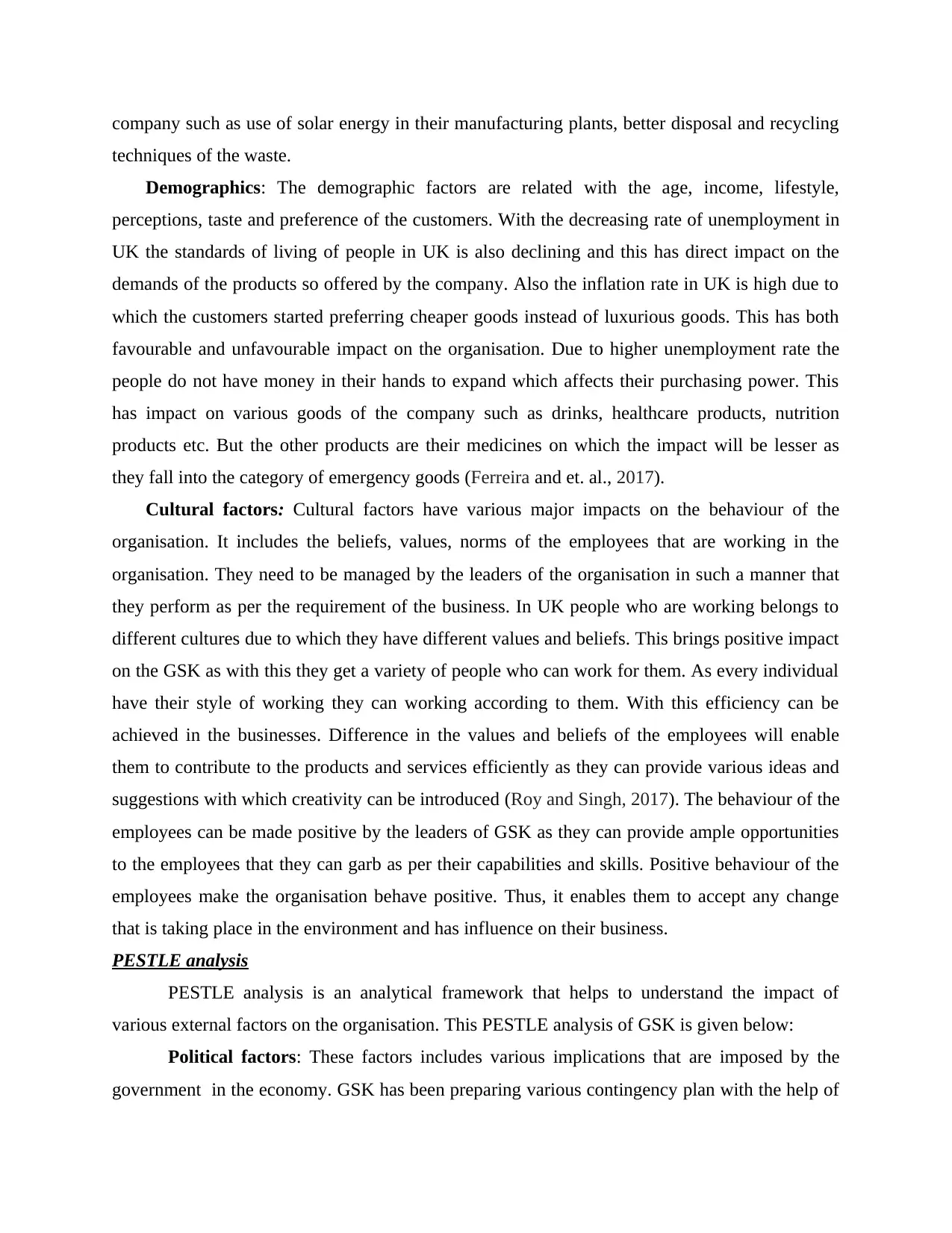
company such as use of solar energy in their manufacturing plants, better disposal and recycling
techniques of the waste.
Demographics: The demographic factors are related with the age, income, lifestyle,
perceptions, taste and preference of the customers. With the decreasing rate of unemployment in
UK the standards of living of people in UK is also declining and this has direct impact on the
demands of the products so offered by the company. Also the inflation rate in UK is high due to
which the customers started preferring cheaper goods instead of luxurious goods. This has both
favourable and unfavourable impact on the organisation. Due to higher unemployment rate the
people do not have money in their hands to expand which affects their purchasing power. This
has impact on various goods of the company such as drinks, healthcare products, nutrition
products etc. But the other products are their medicines on which the impact will be lesser as
they fall into the category of emergency goods (Ferreira and et. al., 2017).
Cultural factors: Cultural factors have various major impacts on the behaviour of the
organisation. It includes the beliefs, values, norms of the employees that are working in the
organisation. They need to be managed by the leaders of the organisation in such a manner that
they perform as per the requirement of the business. In UK people who are working belongs to
different cultures due to which they have different values and beliefs. This brings positive impact
on the GSK as with this they get a variety of people who can work for them. As every individual
have their style of working they can working according to them. With this efficiency can be
achieved in the businesses. Difference in the values and beliefs of the employees will enable
them to contribute to the products and services efficiently as they can provide various ideas and
suggestions with which creativity can be introduced (Roy and Singh, 2017). The behaviour of the
employees can be made positive by the leaders of GSK as they can provide ample opportunities
to the employees that they can garb as per their capabilities and skills. Positive behaviour of the
employees make the organisation behave positive. Thus, it enables them to accept any change
that is taking place in the environment and has influence on their business.
PESTLE analysis
PESTLE analysis is an analytical framework that helps to understand the impact of
various external factors on the organisation. This PESTLE analysis of GSK is given below:
Political factors: These factors includes various implications that are imposed by the
government in the economy. GSK has been preparing various contingency plan with the help of
techniques of the waste.
Demographics: The demographic factors are related with the age, income, lifestyle,
perceptions, taste and preference of the customers. With the decreasing rate of unemployment in
UK the standards of living of people in UK is also declining and this has direct impact on the
demands of the products so offered by the company. Also the inflation rate in UK is high due to
which the customers started preferring cheaper goods instead of luxurious goods. This has both
favourable and unfavourable impact on the organisation. Due to higher unemployment rate the
people do not have money in their hands to expand which affects their purchasing power. This
has impact on various goods of the company such as drinks, healthcare products, nutrition
products etc. But the other products are their medicines on which the impact will be lesser as
they fall into the category of emergency goods (Ferreira and et. al., 2017).
Cultural factors: Cultural factors have various major impacts on the behaviour of the
organisation. It includes the beliefs, values, norms of the employees that are working in the
organisation. They need to be managed by the leaders of the organisation in such a manner that
they perform as per the requirement of the business. In UK people who are working belongs to
different cultures due to which they have different values and beliefs. This brings positive impact
on the GSK as with this they get a variety of people who can work for them. As every individual
have their style of working they can working according to them. With this efficiency can be
achieved in the businesses. Difference in the values and beliefs of the employees will enable
them to contribute to the products and services efficiently as they can provide various ideas and
suggestions with which creativity can be introduced (Roy and Singh, 2017). The behaviour of the
employees can be made positive by the leaders of GSK as they can provide ample opportunities
to the employees that they can garb as per their capabilities and skills. Positive behaviour of the
employees make the organisation behave positive. Thus, it enables them to accept any change
that is taking place in the environment and has influence on their business.
PESTLE analysis
PESTLE analysis is an analytical framework that helps to understand the impact of
various external factors on the organisation. This PESTLE analysis of GSK is given below:
Political factors: These factors includes various implications that are imposed by the
government in the economy. GSK has been preparing various contingency plan with the help of
You're viewing a preview
Unlock full access by subscribing today!
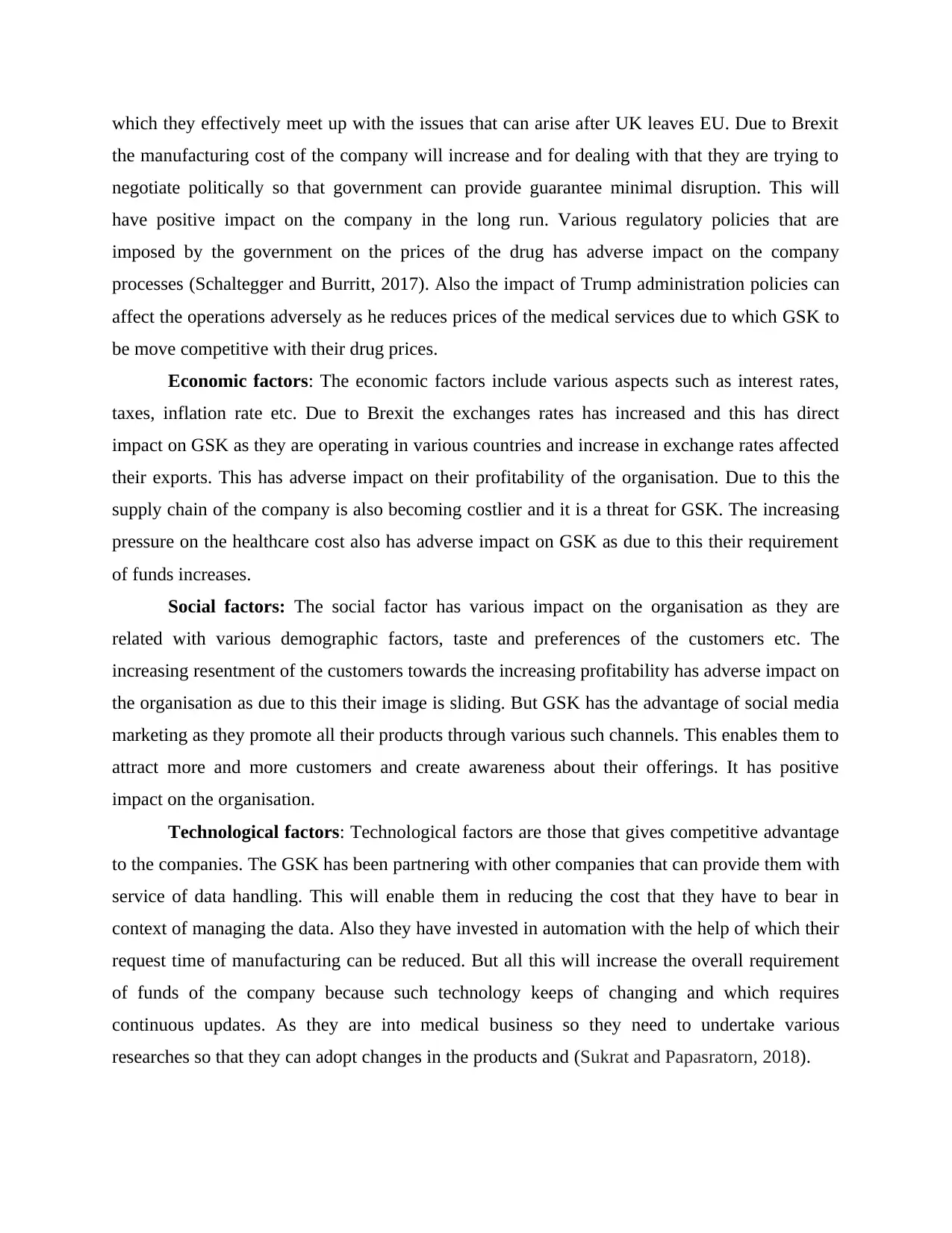
which they effectively meet up with the issues that can arise after UK leaves EU. Due to Brexit
the manufacturing cost of the company will increase and for dealing with that they are trying to
negotiate politically so that government can provide guarantee minimal disruption. This will
have positive impact on the company in the long run. Various regulatory policies that are
imposed by the government on the prices of the drug has adverse impact on the company
processes (Schaltegger and Burritt, 2017). Also the impact of Trump administration policies can
affect the operations adversely as he reduces prices of the medical services due to which GSK to
be move competitive with their drug prices.
Economic factors: The economic factors include various aspects such as interest rates,
taxes, inflation rate etc. Due to Brexit the exchanges rates has increased and this has direct
impact on GSK as they are operating in various countries and increase in exchange rates affected
their exports. This has adverse impact on their profitability of the organisation. Due to this the
supply chain of the company is also becoming costlier and it is a threat for GSK. The increasing
pressure on the healthcare cost also has adverse impact on GSK as due to this their requirement
of funds increases.
Social factors: The social factor has various impact on the organisation as they are
related with various demographic factors, taste and preferences of the customers etc. The
increasing resentment of the customers towards the increasing profitability has adverse impact on
the organisation as due to this their image is sliding. But GSK has the advantage of social media
marketing as they promote all their products through various such channels. This enables them to
attract more and more customers and create awareness about their offerings. It has positive
impact on the organisation.
Technological factors: Technological factors are those that gives competitive advantage
to the companies. The GSK has been partnering with other companies that can provide them with
service of data handling. This will enable them in reducing the cost that they have to bear in
context of managing the data. Also they have invested in automation with the help of which their
request time of manufacturing can be reduced. But all this will increase the overall requirement
of funds of the company because such technology keeps of changing and which requires
continuous updates. As they are into medical business so they need to undertake various
researches so that they can adopt changes in the products and (Sukrat and Papasratorn, 2018).
the manufacturing cost of the company will increase and for dealing with that they are trying to
negotiate politically so that government can provide guarantee minimal disruption. This will
have positive impact on the company in the long run. Various regulatory policies that are
imposed by the government on the prices of the drug has adverse impact on the company
processes (Schaltegger and Burritt, 2017). Also the impact of Trump administration policies can
affect the operations adversely as he reduces prices of the medical services due to which GSK to
be move competitive with their drug prices.
Economic factors: The economic factors include various aspects such as interest rates,
taxes, inflation rate etc. Due to Brexit the exchanges rates has increased and this has direct
impact on GSK as they are operating in various countries and increase in exchange rates affected
their exports. This has adverse impact on their profitability of the organisation. Due to this the
supply chain of the company is also becoming costlier and it is a threat for GSK. The increasing
pressure on the healthcare cost also has adverse impact on GSK as due to this their requirement
of funds increases.
Social factors: The social factor has various impact on the organisation as they are
related with various demographic factors, taste and preferences of the customers etc. The
increasing resentment of the customers towards the increasing profitability has adverse impact on
the organisation as due to this their image is sliding. But GSK has the advantage of social media
marketing as they promote all their products through various such channels. This enables them to
attract more and more customers and create awareness about their offerings. It has positive
impact on the organisation.
Technological factors: Technological factors are those that gives competitive advantage
to the companies. The GSK has been partnering with other companies that can provide them with
service of data handling. This will enable them in reducing the cost that they have to bear in
context of managing the data. Also they have invested in automation with the help of which their
request time of manufacturing can be reduced. But all this will increase the overall requirement
of funds of the company because such technology keeps of changing and which requires
continuous updates. As they are into medical business so they need to undertake various
researches so that they can adopt changes in the products and (Sukrat and Papasratorn, 2018).
Paraphrase This Document
Need a fresh take? Get an instant paraphrase of this document with our AI Paraphraser
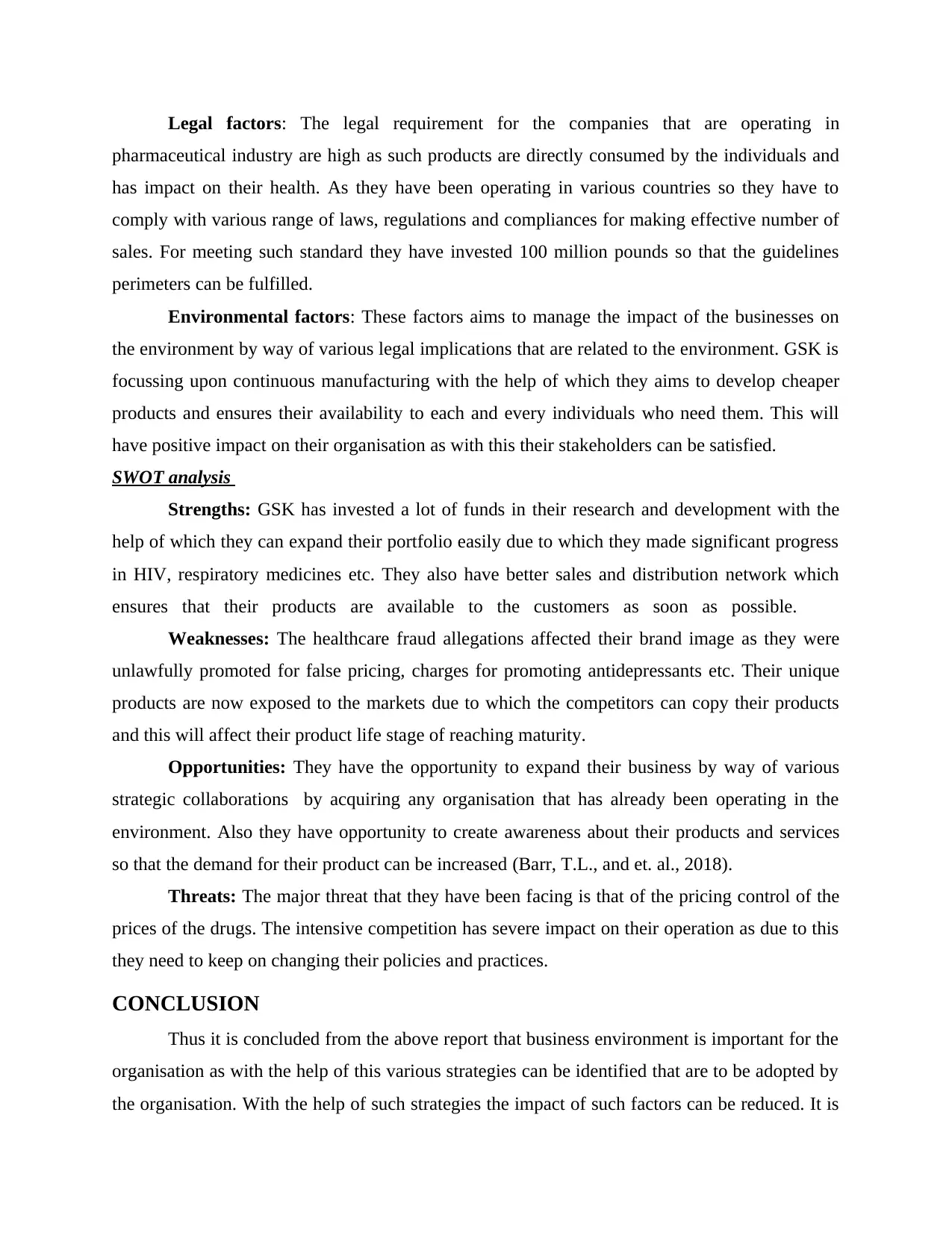
Legal factors: The legal requirement for the companies that are operating in
pharmaceutical industry are high as such products are directly consumed by the individuals and
has impact on their health. As they have been operating in various countries so they have to
comply with various range of laws, regulations and compliances for making effective number of
sales. For meeting such standard they have invested 100 million pounds so that the guidelines
perimeters can be fulfilled.
Environmental factors: These factors aims to manage the impact of the businesses on
the environment by way of various legal implications that are related to the environment. GSK is
focussing upon continuous manufacturing with the help of which they aims to develop cheaper
products and ensures their availability to each and every individuals who need them. This will
have positive impact on their organisation as with this their stakeholders can be satisfied.
SWOT analysis
Strengths: GSK has invested a lot of funds in their research and development with the
help of which they can expand their portfolio easily due to which they made significant progress
in HIV, respiratory medicines etc. They also have better sales and distribution network which
ensures that their products are available to the customers as soon as possible.
Weaknesses: The healthcare fraud allegations affected their brand image as they were
unlawfully promoted for false pricing, charges for promoting antidepressants etc. Their unique
products are now exposed to the markets due to which the competitors can copy their products
and this will affect their product life stage of reaching maturity.
Opportunities: They have the opportunity to expand their business by way of various
strategic collaborations by acquiring any organisation that has already been operating in the
environment. Also they have opportunity to create awareness about their products and services
so that the demand for their product can be increased (Barr, T.L., and et. al., 2018).
Threats: The major threat that they have been facing is that of the pricing control of the
prices of the drugs. The intensive competition has severe impact on their operation as due to this
they need to keep on changing their policies and practices.
CONCLUSION
Thus it is concluded from the above report that business environment is important for the
organisation as with the help of this various strategies can be identified that are to be adopted by
the organisation. With the help of such strategies the impact of such factors can be reduced. It is
pharmaceutical industry are high as such products are directly consumed by the individuals and
has impact on their health. As they have been operating in various countries so they have to
comply with various range of laws, regulations and compliances for making effective number of
sales. For meeting such standard they have invested 100 million pounds so that the guidelines
perimeters can be fulfilled.
Environmental factors: These factors aims to manage the impact of the businesses on
the environment by way of various legal implications that are related to the environment. GSK is
focussing upon continuous manufacturing with the help of which they aims to develop cheaper
products and ensures their availability to each and every individuals who need them. This will
have positive impact on their organisation as with this their stakeholders can be satisfied.
SWOT analysis
Strengths: GSK has invested a lot of funds in their research and development with the
help of which they can expand their portfolio easily due to which they made significant progress
in HIV, respiratory medicines etc. They also have better sales and distribution network which
ensures that their products are available to the customers as soon as possible.
Weaknesses: The healthcare fraud allegations affected their brand image as they were
unlawfully promoted for false pricing, charges for promoting antidepressants etc. Their unique
products are now exposed to the markets due to which the competitors can copy their products
and this will affect their product life stage of reaching maturity.
Opportunities: They have the opportunity to expand their business by way of various
strategic collaborations by acquiring any organisation that has already been operating in the
environment. Also they have opportunity to create awareness about their products and services
so that the demand for their product can be increased (Barr, T.L., and et. al., 2018).
Threats: The major threat that they have been facing is that of the pricing control of the
prices of the drugs. The intensive competition has severe impact on their operation as due to this
they need to keep on changing their policies and practices.
CONCLUSION
Thus it is concluded from the above report that business environment is important for the
organisation as with the help of this various strategies can be identified that are to be adopted by
the organisation. With the help of such strategies the impact of such factors can be reduced. It is
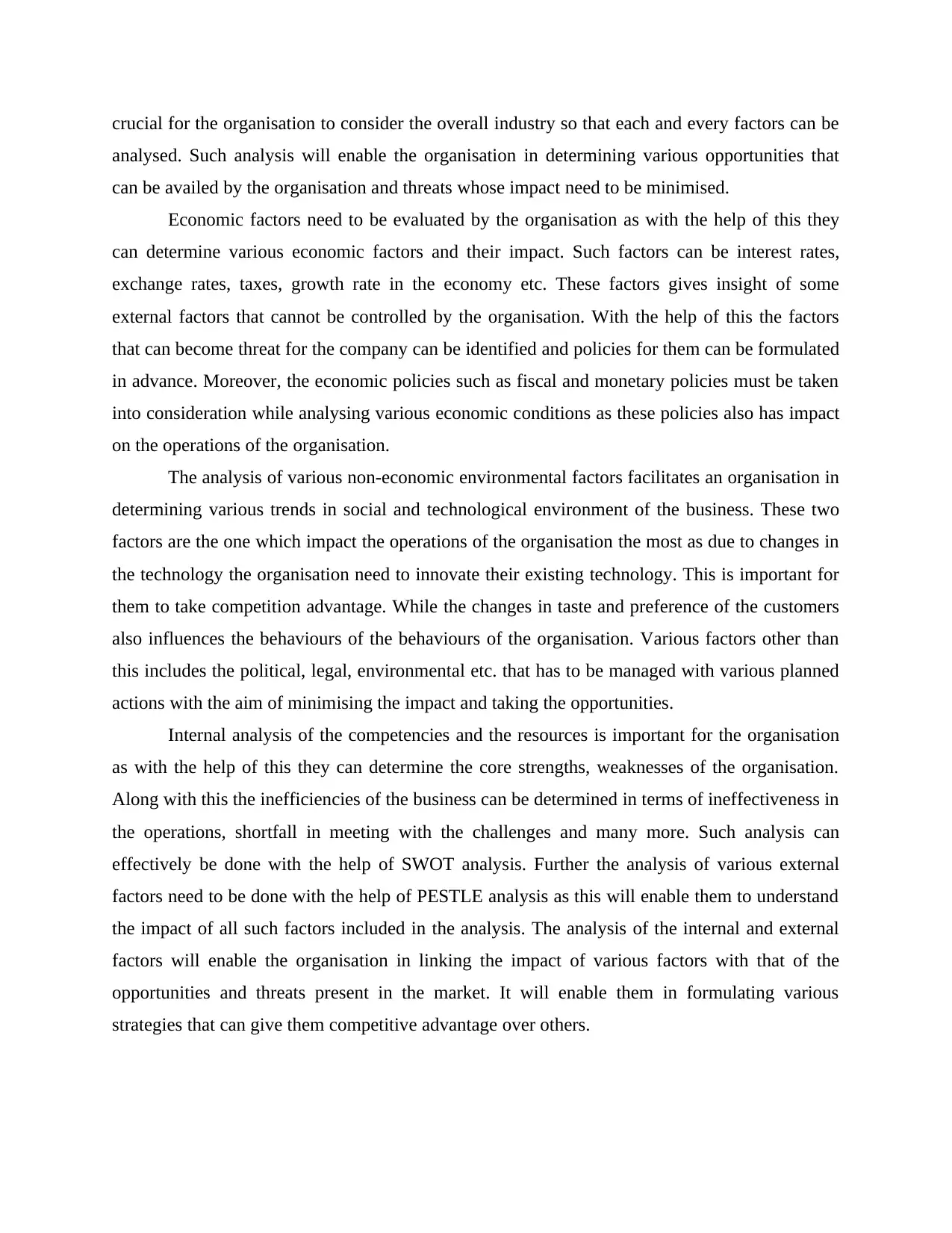
crucial for the organisation to consider the overall industry so that each and every factors can be
analysed. Such analysis will enable the organisation in determining various opportunities that
can be availed by the organisation and threats whose impact need to be minimised.
Economic factors need to be evaluated by the organisation as with the help of this they
can determine various economic factors and their impact. Such factors can be interest rates,
exchange rates, taxes, growth rate in the economy etc. These factors gives insight of some
external factors that cannot be controlled by the organisation. With the help of this the factors
that can become threat for the company can be identified and policies for them can be formulated
in advance. Moreover, the economic policies such as fiscal and monetary policies must be taken
into consideration while analysing various economic conditions as these policies also has impact
on the operations of the organisation.
The analysis of various non-economic environmental factors facilitates an organisation in
determining various trends in social and technological environment of the business. These two
factors are the one which impact the operations of the organisation the most as due to changes in
the technology the organisation need to innovate their existing technology. This is important for
them to take competition advantage. While the changes in taste and preference of the customers
also influences the behaviours of the behaviours of the organisation. Various factors other than
this includes the political, legal, environmental etc. that has to be managed with various planned
actions with the aim of minimising the impact and taking the opportunities.
Internal analysis of the competencies and the resources is important for the organisation
as with the help of this they can determine the core strengths, weaknesses of the organisation.
Along with this the inefficiencies of the business can be determined in terms of ineffectiveness in
the operations, shortfall in meeting with the challenges and many more. Such analysis can
effectively be done with the help of SWOT analysis. Further the analysis of various external
factors need to be done with the help of PESTLE analysis as this will enable them to understand
the impact of all such factors included in the analysis. The analysis of the internal and external
factors will enable the organisation in linking the impact of various factors with that of the
opportunities and threats present in the market. It will enable them in formulating various
strategies that can give them competitive advantage over others.
analysed. Such analysis will enable the organisation in determining various opportunities that
can be availed by the organisation and threats whose impact need to be minimised.
Economic factors need to be evaluated by the organisation as with the help of this they
can determine various economic factors and their impact. Such factors can be interest rates,
exchange rates, taxes, growth rate in the economy etc. These factors gives insight of some
external factors that cannot be controlled by the organisation. With the help of this the factors
that can become threat for the company can be identified and policies for them can be formulated
in advance. Moreover, the economic policies such as fiscal and monetary policies must be taken
into consideration while analysing various economic conditions as these policies also has impact
on the operations of the organisation.
The analysis of various non-economic environmental factors facilitates an organisation in
determining various trends in social and technological environment of the business. These two
factors are the one which impact the operations of the organisation the most as due to changes in
the technology the organisation need to innovate their existing technology. This is important for
them to take competition advantage. While the changes in taste and preference of the customers
also influences the behaviours of the behaviours of the organisation. Various factors other than
this includes the political, legal, environmental etc. that has to be managed with various planned
actions with the aim of minimising the impact and taking the opportunities.
Internal analysis of the competencies and the resources is important for the organisation
as with the help of this they can determine the core strengths, weaknesses of the organisation.
Along with this the inefficiencies of the business can be determined in terms of ineffectiveness in
the operations, shortfall in meeting with the challenges and many more. Such analysis can
effectively be done with the help of SWOT analysis. Further the analysis of various external
factors need to be done with the help of PESTLE analysis as this will enable them to understand
the impact of all such factors included in the analysis. The analysis of the internal and external
factors will enable the organisation in linking the impact of various factors with that of the
opportunities and threats present in the market. It will enable them in formulating various
strategies that can give them competitive advantage over others.
You're viewing a preview
Unlock full access by subscribing today!
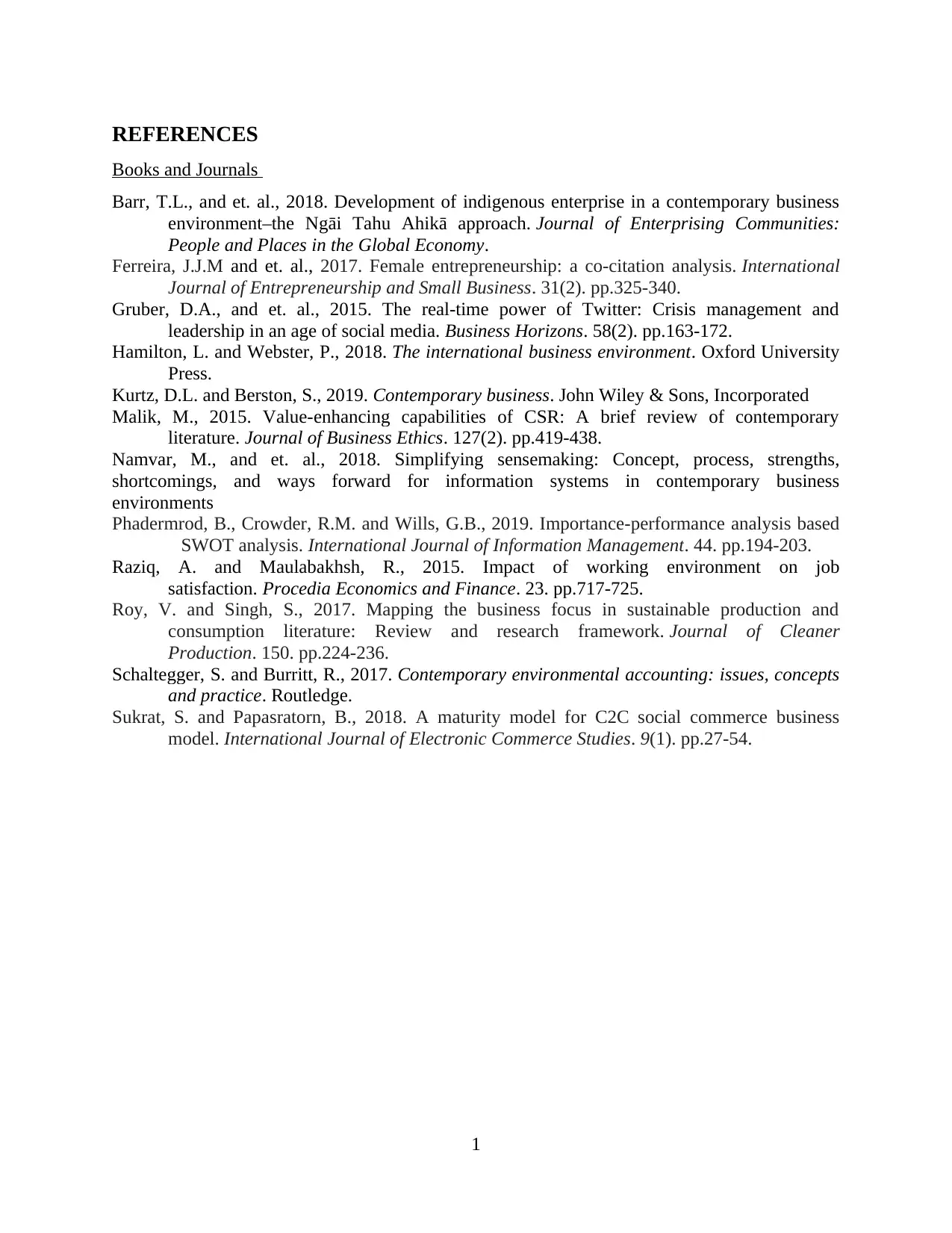
REFERENCES
Books and Journals
Barr, T.L., and et. al., 2018. Development of indigenous enterprise in a contemporary business
environment–the Ngāi Tahu Ahikā approach. Journal of Enterprising Communities:
People and Places in the Global Economy.
Ferreira, J.J.M and et. al., 2017. Female entrepreneurship: a co-citation analysis. International
Journal of Entrepreneurship and Small Business. 31(2). pp.325-340.
Gruber, D.A., and et. al., 2015. The real-time power of Twitter: Crisis management and
leadership in an age of social media. Business Horizons. 58(2). pp.163-172.
Hamilton, L. and Webster, P., 2018. The international business environment. Oxford University
Press.
Kurtz, D.L. and Berston, S., 2019. Contemporary business. John Wiley & Sons, Incorporated
Malik, M., 2015. Value-enhancing capabilities of CSR: A brief review of contemporary
literature. Journal of Business Ethics. 127(2). pp.419-438.
Namvar, M., and et. al., 2018. Simplifying sensemaking: Concept, process, strengths,
shortcomings, and ways forward for information systems in contemporary business
environments
Phadermrod, B., Crowder, R.M. and Wills, G.B., 2019. Importance-performance analysis based
SWOT analysis. International Journal of Information Management. 44. pp.194-203.
Raziq, A. and Maulabakhsh, R., 2015. Impact of working environment on job
satisfaction. Procedia Economics and Finance. 23. pp.717-725.
Roy, V. and Singh, S., 2017. Mapping the business focus in sustainable production and
consumption literature: Review and research framework. Journal of Cleaner
Production. 150. pp.224-236.
Schaltegger, S. and Burritt, R., 2017. Contemporary environmental accounting: issues, concepts
and practice. Routledge.
Sukrat, S. and Papasratorn, B., 2018. A maturity model for C2C social commerce business
model. International Journal of Electronic Commerce Studies. 9(1). pp.27-54.
1
Books and Journals
Barr, T.L., and et. al., 2018. Development of indigenous enterprise in a contemporary business
environment–the Ngāi Tahu Ahikā approach. Journal of Enterprising Communities:
People and Places in the Global Economy.
Ferreira, J.J.M and et. al., 2017. Female entrepreneurship: a co-citation analysis. International
Journal of Entrepreneurship and Small Business. 31(2). pp.325-340.
Gruber, D.A., and et. al., 2015. The real-time power of Twitter: Crisis management and
leadership in an age of social media. Business Horizons. 58(2). pp.163-172.
Hamilton, L. and Webster, P., 2018. The international business environment. Oxford University
Press.
Kurtz, D.L. and Berston, S., 2019. Contemporary business. John Wiley & Sons, Incorporated
Malik, M., 2015. Value-enhancing capabilities of CSR: A brief review of contemporary
literature. Journal of Business Ethics. 127(2). pp.419-438.
Namvar, M., and et. al., 2018. Simplifying sensemaking: Concept, process, strengths,
shortcomings, and ways forward for information systems in contemporary business
environments
Phadermrod, B., Crowder, R.M. and Wills, G.B., 2019. Importance-performance analysis based
SWOT analysis. International Journal of Information Management. 44. pp.194-203.
Raziq, A. and Maulabakhsh, R., 2015. Impact of working environment on job
satisfaction. Procedia Economics and Finance. 23. pp.717-725.
Roy, V. and Singh, S., 2017. Mapping the business focus in sustainable production and
consumption literature: Review and research framework. Journal of Cleaner
Production. 150. pp.224-236.
Schaltegger, S. and Burritt, R., 2017. Contemporary environmental accounting: issues, concepts
and practice. Routledge.
Sukrat, S. and Papasratorn, B., 2018. A maturity model for C2C social commerce business
model. International Journal of Electronic Commerce Studies. 9(1). pp.27-54.
1
1 out of 10
Related Documents
Your All-in-One AI-Powered Toolkit for Academic Success.
+13062052269
info@desklib.com
Available 24*7 on WhatsApp / Email
![[object Object]](/_next/static/media/star-bottom.7253800d.svg)
Unlock your academic potential
© 2024 | Zucol Services PVT LTD | All rights reserved.





